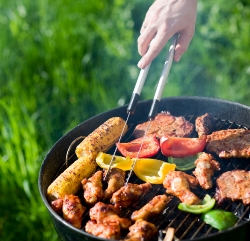To BBQ or not to BBQ...
The barbecue season has officially begun but when it comes to cooking alfresco are we fully aware of the potential perils of cooking on coals?
 At the first hint of summer, we retrieve our rusty barbecues from our sheds and garages and optimistically scrub them in readiness for an outdoor feast with friends and family. However, it’s not quite that simple. Barbecuing isn’t just a case of slapping some meat over hot charcoal until it looks cooked. In fact barbecues are a common cause of food poisoning over the summer months, making it something of a threat to our great British summer tradition if safety steps are not followed.
At the first hint of summer, we retrieve our rusty barbecues from our sheds and garages and optimistically scrub them in readiness for an outdoor feast with friends and family. However, it’s not quite that simple. Barbecuing isn’t just a case of slapping some meat over hot charcoal until it looks cooked. In fact barbecues are a common cause of food poisoning over the summer months, making it something of a threat to our great British summer tradition if safety steps are not followed.
Raw or undercooked meat can contain germs that can cause food poisoning such as salmonella, E.coli, bacillus cereus and campylobacter. While food poisoning is common with approximately 5.5 million cases in the UK each year, it can be very unpleasant and potentially worse for children, older people and those with weakened immune systems.
Campylobacter is by far the single more common cause accounting for half a million cases each year although in most cases the cause isn’t often identified. Bacillus Cereus which has been in the news lately in relation to the recent neonatal blood poisoning story is in fact more commonly a cause of food poisoning resulting from poorly stored rice salads, a regular feature at barbecues.
The NHS Choices website recommends that when cooking any kind of meat on a barbecue those at the helm should ensure:
- The coals are glowing red with a powdery grey surface before cooking commences
- Frozen meat is properly thawed
- That meat is turned regularly and moved around the barbecue to cook it evenly
And that meat is safe to eat when:
- It is piping hot in the centre
- There is no pink meat visible
- Any juices are clear
When barbecuing it is easy for germs from raw meat to move onto hands, utensils and cooked meat causing cross contamination, so washing hands and keeping items separate is essential.
In the case of trying to combat the multiplication of germs such as bacillus cereus it’s important to keep food cool. It is recommended that food isn’t left out of the fridge for more than two hours and never left in the sun.
While it’s clear we must be mindful of our health when cooking outdoors, provided we follow the guidance available we should be set for a great summer of barbecues. All we need now is for the great British weather to play ball.
For full details on the dos and don’ts of barbecuing, check out the NHS Choices website.
